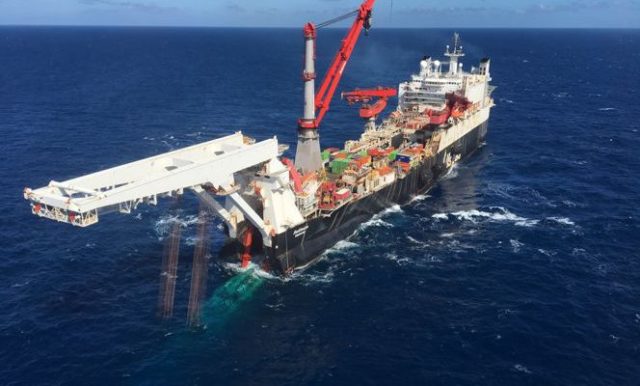
Nord Stream Two Makes New Headway, as Pressure Mounts to Block the Pipeline
Publication: Eurasia Daily Monitor Volume: 15 Issue: 163
By:

Nearly a hundred members of the European Parliament (MEP) sent an open letter to German Chancellor Angela Merkel, on November 7, imploring her to halt the construction of the Nord Stream Two natural gas pipeline. The MEPs referred to the pipeline—designed to carry an additional 55 billion cubic meters (bcm) of Russian gas per year directly to Germany via the Baltic seafloor—as further “strategic leverage” for Russia to wield over the European Union (RIA Novosti, November 11). The diverse group of europarliamentarians signed on to the appeal soon after the reported completion of a 200-kilometer stretch of the pipeline in the Baltic Sea (Nord-stream2.com, November 6). The pace of construction is impressive given that the subsea works in the Baltic only began in September. Construction in the territorial waters of Germany and Finland is slated for completion by the end of 2018.
Although the project appears to be moving along steadily, two major challenges remain that must be overcome before the pipeline can be commissioned:
First and foremost, Denmark continues to drag its feet on whether to allow the pipeline to pass through its territorial waters (Thelocal.dk, August 10) In 2017, legislative changes were made that granted the Danish Ministry of Foreign Affairs the right to veto pipeline construction in its territorial waters for reasons of national security. The Danish Energy Agency is conducting public hearings on the Nord Stream Two pipeline project this week (November 14) and will accept recommendations until the year’s end (Ens.dk, November 7).
Second, the United States is still keeping the sanctions option alive. The Donald Trump administration has repeatedly threatened to impose sanctions under its Countering America’s Adversaries Through Sanctions Act (CAATSA) on entities involved in the project. During his visit to Poland and Ukraine, which staunchly oppose the project, US Energy Secretary Rick Perry reiterated the administration’s unwavering opposition to the pipeline and did not preclude the possibility of sanctions against companies involved in the Nord Stream expansion. “They [the Russians] may still go through with it, but we’re going to do everything that we can to give the European Union as many options as they can have,” he said, adding, “it’s not just about the US selling liquefied natural gas [LNG] to Europe” (Kyiv Post, November 12).
Meanwhile, the Trump administration is expanding energy cooperation between the United States and countries in Central and Eastern Europe to reduce their dependence on a single source of energy supply, namely Russia. In Warsaw, Perry attended the signing of an LNG contract between Cheniere Energy and the Polish Oil and Gas Company (PGNiG)—the second such supply contract signed between US and Polish companies in the last month. Earlier in October, PGNiG signed a 20-year deal with the US-based Venture Global LNG (Energy.gov, November 11).
Nonetheless, Ukraine doubts the practicality of opposing Nord Stream Two. As such, it has already started to prepare for the worst-case scenario—an end to, or at the very least a serious reduction in, transit of Russian Europe-bound gas through the Ukrainian domestic pipeline network. Recently, Ukrainian Naftogaz CEO Yuri Vitrenko admitted that “it is already impossible to stop the construction of the Nord Stream Two” pipeline and called promises to maintain transit through Ukraine once the pipeline is commissioned futile (Neftegaz.ru, November 7).
As negotiations between Ukraine, Russia and the European Commission on the fate of the transit have so far failed to yield positive results, Kyiv has opted to deploy a two-pronged approach in its dealings with Gazprom. On the domestic front, Ukraine has already significantly improved its gas storage capacity by injecting substantial volumes into its underground storage sites (Ukrinform, November 10). And on the global stage, it has been applying pressure on Gazprom through international arbitration to be compensated for transit losses (see EDM, June 21, 2017; March 5, 2018). The latter tactic has begun to yield some positive results for Kyiv.
According to financial statements of Gazprom’s Luxembourg-based subsidiary, a Swiss court ordered the Nord Stream and Nord Stream Two companies to halt any payments to Gazprom based on the decision of a Stockholm court in December 2017 and February 2018. This was a serious blow to Gazprom’s credit rating as the company actively seeks to raise funds by selling debt for its multibillion-dollar infrastructure projects (RT, November 12). Vitrenko noted that Naftogaz plans to initiate $12 billion in new arbitration cases against Gazprom if the latter decides to bypass Ukraine after the current transit agreement expires on December 31, 2019 (Interfax, November 12; Ukrinform, July 24).
It appears that, in the near future, the legal tug of war will continue between Gazprom and Naftogaz. But absent minor logistical issues, the Russian gas giant and its partners plan to finish Nord Stream Two by the announced deadline; and any progress on the pipeline in the meantime will only make Gazprom’s negotiating position that much stronger.



